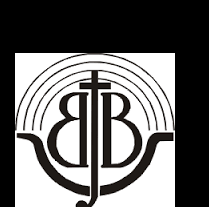Singing has a special significance for the UBB. The choir of the congregation of the UBB in Palisády was one of the oldest and largest ones in Bratislava; at the time of its greatest boom in the late 1960s, it had about 70 members. In addition, there were unofficial amateur efforts of young people to perform gospel music with guitar accompaniment in prayer halls outside the divine services and in their free time around campfires in the countryside, etc. from the late 1950s onwards. An instrumental band called Matuzalemci [Methuselahs], a girls’ vocal ensemble called Polarisky [Pole Stars], and a children’s choir conducted by Vojtech Paulen, were also active within the congregation.
The activities of the congregations of the Unity of the Brethren Baptists in the Slovak Republic (UBB) in the field of music were focused on publishing, updating and reviving hymnals. They used the Bratrské písně [Brethren Hymns] (1923) and the Jásavý chvalozpěv [Jubilant Hymn](1924) Czecho-Slovak hymnals meant for the divine services. The Slovak Piesne duchovné [Hymns] (1947) was published by Czech and Slovak believers from Canada and the US who also arranged for their distribution in Slovakia. In 1959, a Hymnal Committee started to work on a new edition of this hymnal, and it appeared in 1971. Just before the Velvet Revolution of 1989, they published a hymnal called Chválospevy I. Zborník piesní pre spevokoly [Hymns I. Anthology of Songs for Choirs] (ed. Vojtech Paulen, Vladimír Dvořák, Ľudovít Betko; Bratislava: Unity of the Brethren Baptists in the Slovak Socialist Republic, Cirkevné nakladateľstvo, 1989, 3,000 copies) with official approval. It contains 74 hymns, mostly from among the old hymns by German, English, North American and Czech authors, but also by Hungarian Baptists with whom the Baptist Congregation in Palisády was in close contact. Spirituals and gospel songs were sung by soloists in the Baptist Congregation or by a vocal octet. The lyrics of most of the spirituals were translated by Ondrej Betko jr. who distributed them to young people. Members of Baptists congregations from Canada used to send the music as individual sheets of the music editions. In compiling hymnals, organizing performances and issuing or releasing samizdats, the UBB collaborated with members of the Church of the Brethren in Cukrová Street in Bratislava.
An LP, Zborové duchovné spevy. Spevácky zbor Bratskej jednoty Baptistov v Bratislave [Hymns for Choir. Choir of the Unity of the Brethren Baptists](conducted by Vojtech Paulen; Prague: Supraphon, 1969, 029 9878), bears witness to the ability of the members of the UBB to make use of their contacts in Czechoslovakia and abroad. The record label and the year are not stated on the Kľúč života a smrti/Bôh je láska [The Key of Life and Death/God is Love](SP 3225 E – 1 B) SP, so we may assume that it was released semilegally and with the help of the contacts of the UBB with people employed in gramophone factories.
Baptist congregations were always in close contact with congregations in the west. To spread the Gospel within their church, they needed literature, the Bible, hymnals and information about developments in Czechoslovakia and abroad. For the atheistic ideology of socialism, any religion was unacceptable. The practice was such that, if some singers came to them from western countries to perform, they left their sound equipment, including their microphones, here. As Slávo Kráľ recounts, congregations in the Czech Republic and in Slovakia competed with each other in getting the equipment, although their collaboration was always fair. The state authorities turned a blind eye to what was going on in the churches as long as they did not leave the premises of the church. Each preacher of the Unity of the Brethren Baptists, whether a paid one or a lay one, had to have an approval from the state and was liable for what was happening during the divine services. Performances outside a church were regarded as concerts and, consequently, required a permission by the local National Committee and the performers had to pass exams in front of the District Committee or the Slovkoncert Committee. Whenever the members of the Matuzalem ensemble performed outside the church, they had their answers prepared to any questions by the National Security in case they found a larger number of hymnals or asked where they were going to play, whether they had a permission, whether they had passed the requalification exams etc. Although the choir of the Unity of the Brethren Baptists had a permission to go on tours – series of concerts within their own congregations in Slovakia, the preachers always emphasized to them to keep quiet and not to call attention to themselves.

